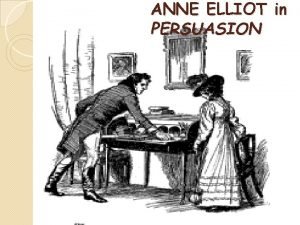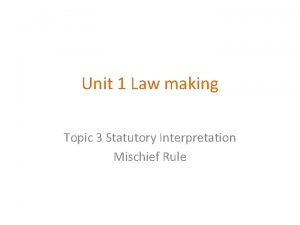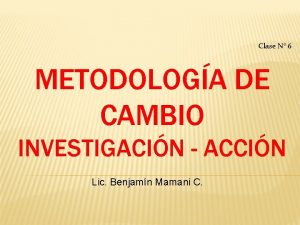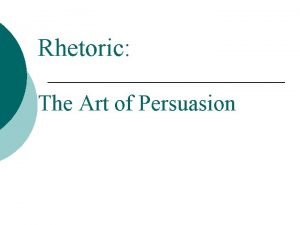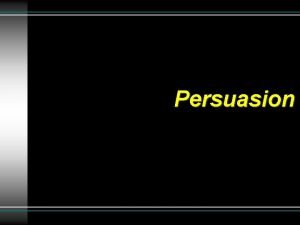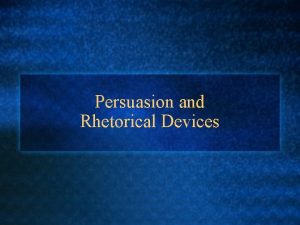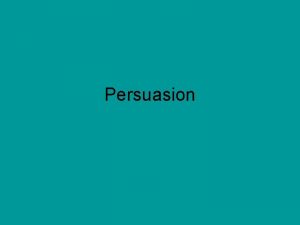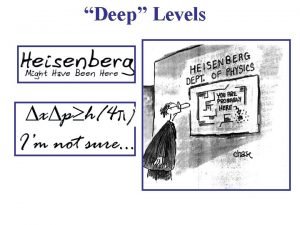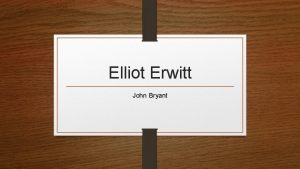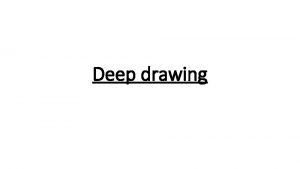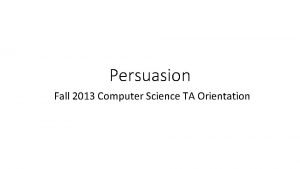ANNE ELLIOT in PERSUASION Deep analysis of Anne
















- Slides: 16

ANNE ELLIOT in PERSUASION

Deep analysis of Anne ELLIOT The novel's protagonist and the overlooked middle daughter of Sir Walter Elliot of Kellynch Hall. As a character, Anne quickly wins and holds the reader's sympathies. With few to appreciate her sweet nature and refined, elegant mind, Anne is somewhat isolated. Because she is neither the most beautiful nor the most image-conscious of his daughters, Sir Walter often overlooks Anne, slights her, and dismisses her opinions. � “Anne, with elegance of mind and sweetness of character, which must have placed her high with any people of real understanding, was nobody with either father or sister; her word had no weight; her convenience was always to give way; she was only Anne. ” (Austen, 5) � Austen very frankly notes that the bloom of youth has left Anne, and that she is not the prettiest of the young ladies in the novel. Unique among Jane Austen heroines, she is 27 years old and seemingly a confirmed spinster. However, Anne becomes most decidedly more attractive when her better qualities are noted. � “A few years before, Anne Elliot had been a very pretty girl, but her bloom had vanished early; and as even in its height, her father had found little to admire in her (so totally different were her delicate features and mild dark eyes from his own), there could be nothing in them, now that she was faded and thin, to excite his esteem. ” (Austen, 5) �

� When Sir Walter Elliot thought that good company was always worth seeking and family connexions always worth preserving, it was very desirable that the conation between Lady Dalrymple, a rich relative, and Sir Walter Elliot. According to Anne this was not desirable because she gives importance intelligence and knowledge in a company. There was no superiority of manner, accomplishment, or understanding for her. � “My idea of good company, Mr. Elliot, is the company of clever, well-informed people, who have a great deal of conversation; that is what I call good company. ” (Austen, 116)

� Anne is proud of her appearance, and she is deeply hurt after overhearing that Captain Wentworth thinks her appearance much changed for the worst. � “Captain Wentworth is not very gallant by you, Anne, though he was so attentive to me. Henrietta asked him what he thought of you, when they went away; and he said, “You were so altered he should not have known you again. ” “Altered beyond his knowledge!” Anne fully submitted, in silent, deep mortification. Doubtless it was so; and she could take no revenge, for he was not altered, or not for the worse. She had already acknowledged it to herself, and she could not think differently, let him think of her as he would. No; the years which had destroyed her youth and bloom had only given him a more glowing, manly, open look, in no respect lessening his personal advantages. She had seen the same Frederick Wentworth. (Austen, 46)

� Such qualities as level-headed in difficult situations and constant in her affections make her the desirable sister to marry; she is the first choice of Charles Musgrove, Captain Wentworth, and Mr. Elliot. In such a difficult situation as when Louisa fell on the pavement and was taken up lifeless, everybody was panic and did not know what to do, only Anne was able to direct people around her. Her coolheaded competence in dealing with Louisa's injury establishes her as both capable and responsive to a sense of duty. � “Anne attending with all the strength and zeal, and thought, which instinct supplied, to Henrietta, still tried, at intervals, to suggest comfort to the others, tried to quiet Mary, to animate Charles, to assuage the feelings of Captain Wentworth. Both seemed to look to her for directions. ” (Austen, 86)

� Though Anne seeks love, she is conscious of her duty to her position and the prudence of making a suitable match. Seeking to please those around her, in her youth, she was persuaded from following her true desires. She knows how to balance duty and passion in a composed and respectful way. She neither blames Lady Russell for her over-cautious advice, nor herself for taking it – though she is now sure that she chose wrongly. She couldn’t help saying “I wish…”. She was somewhat regretful because she never gave up loving Captain Wentworth. She said she would even renew the engagement if asked. � “…but Anne, at seven-and-twenty, thought very differently from what she had been made to think at nineteen. –She did not blame Lady Russell, she did not blame herself for having been guided by her; but she felt that were any young person, in similar circumstances, to apply to her for counsel, they would never receive any of such certain immediate wretchedness, such uncertain future good. –She was persuaded that under every disadvantage of disapprobation at home, and every anxiety attending his profession, all their probable fears, delays and disappointments, she should yet have been a happier woman in maintaining the engagement than she had been in the sacrifice of it; and this, she fully believed, had the usual share, had even more than a usual share of all such solicitudes and suspense been theirs, without reference to the actual results of their case, which, as it happened, would have bestowed earlier prosperity than could be reasonably calculated on. ” (Austen, 22)

� “How eloquent could Anne Elliot have been –how eloquent, at least, were her wishes on the side of early warm attachment, and a cheerful confidence in futurity, against that over-anxious caution which seems to insult exertion and distrust Providence! She had been forced into prudence in youth she learned romance as she grew older-the natural sequel of an unnatural beginning. With all these circumstances, recollections and feelings she could not hear that Captain Wentworth’s sister was likely to live at Kellynch, without a revival of former pain; and many a stroll and many a sigh were necessary to dispel the agitation of the idea. She often told herself it was folly before she could harden her nerves sufficiently to feel the continual discussion of the Crofts and their business no evil. ” (Austen, 23) � “…Tell me if, when I returned to England in the year eight, with a few thousand pound, and was posted into the Laconia, if I had then written to you, would you have answered my letter? Would you, in short, have renewed the engagement then? “Would I!” was all her answer; but the accent was decisive enough. “Good God!” he cried, “you would!” (Austen, 194)

� Anne explains to Captain Wentworth the reason behind her initial decision, eight years ago, to break their engagement. She concludes that it was correct of her to yield to persuasion by Lady Russell because she had a duty to her rank and to safety. What is notable about this passage is the cool rationality which Anne employs. Though Austen writes about marriages, her novels are not entirely about "romance. " Passion must be tempered by reason and practicality if a marriage is to be successful. � “If I was wrong in yielding to persuasion once, remember that it was to persuasion exerted on the side of safety, not of risk. When I yielded, I thought it was to duty; but no duty could be called in aid here. In marrying a man indifferent to me, all risk would have been incurred and all duty violated. ” (Austen, 192)

� “I have been thinking over the past, and trying impartially to judge of the right and wrong, I mean with regard to myself; and I must believe that I was right, much as I suffered from it, that I was perfectly right in being guided by the friend whom you will love better than you do now. To me she was in the place of a parent. Do not mistake me, however. I am not saying that she did not err in her advice. It was, perhaps, one of those cases in which advice is good or bad only as the event decides; and for myself, I certainly never should, in any circumstance of tolerable similarity, give such advice. But I mean that I was right in submitting to her, and that if I had done otherwise, I should have suffered more in continuing the engagement than I did even in giving it up, because I should have suffered in my conscience. I have now, as far as such a sentiment is allowable in human nature, nothing to reproach myself with; and if I mistake not, a strong sense of duty is no bad part of a woman’s portion. ” (Austen, 193 -194)

� Anne said to her sister Mary when discussing Charles's desire to go out to dinner and leave his sick child to be cared for at home. Anne suggests what the correct motherly feelings and actions should be. Mary does not have a mother's protective instinct, and would prefer to leave her child to the care of someone else. Anne subtly disapproves of such unmotherly behavior. Anne also reinforces a belief in the idea that the public domain is the responsibility of the male and the domestic domain is the responsibility of the female. Anne believes that nursing is a woman's job, and infers that Mary should therefore not be upset if her husband refuses to do it. � “I dare say we shall have nothing to distress us. I perfectly understand Mr. Robinson’s directions, and have no fears; and indeed, Mary, I cannot wonder at your husband. Nursing does not belong to a man, it is not his province. A sick child is always the mother's property, her own feelings generally make it so. ” (Austen, 43)

� Anne is not one to avoid her responsibility and duty as a member of the upper class. She understands and respects the importance of making a suitable match, and is offended by the prospect of someone as low as Mrs. Clay entering into her family through marriage. She is conscious of the social structure in which her relations operate, and though she may seek a bit more flexibility, she by no means wishes to seriously challenge notions of class. � “Anne herself was become hardened to such affronts; but she felt the imprudence of the arrangement quite as keenly as Lady Russell. With a great deal of quiet observation, and a knowledge, which she often wished less, of her father’s character, she was sensible that results the most serious to his family from the intimacy were more than possible. She did not imagine that her father had at present an idea of the kind. Mrs. Clay had freckles, and a projecting tooth, and a clumsy wrist, which he was continually making severe remarks upon, in her absence; but she was young, and certainly altogether well looking, and possessed, in an acute mind assiduous pleasing manners, infinitely more dangerous attractions than any merely personal might have been. Anne was so impressed by the degree of their danger that she could not excuse herself from trying to make it perceptible to her sister. (Austen, 25 -26)

Some persuasions in the novel � Firstly, Lady Russell persuaded Anne to break off an engagement with Frederick Wentworth-a man whom she loved passionately. � “Anne Elliot, with all her claims of birth, beauty, and mind, to throw herself away at nineteen; involve herself at nineteen in an engagement with a young man, who had nothing but himself to recommend him, and no hopes of attaining affluence, but in the chances of a most uncertain profession; would be, indeed, a throwing away, which she grieved to think of! Anne Elliot, so young; known to so few, to be snatched off by a stranger without alliance or fortune; or rather sunk by him into a state of most wearing, anxious, youth-killing dependence! It must not be, if by any fair interference of friendship, any representations from one who had almost a mother’s love, and mother’s rights, it would be prevented. (Austen, 20)

� Such oppositions as these feelings produced more than Anne could combat. Young and gentle as she was, it might have been possible to withstand her father’s ill will, though unsoftened by one kind word or look on the part of her sister -but Lady Russell, whom she had always loved and relied on, could not, with such steadiness of opinion, and such tenderness of manner, be continually advising her in vain. She was persuaded to believe the engagement a wrong thingindiscreet, a merely selfish caution, under which she acted, in putting an end to it. Had she not imagined herself consulting his good, even more than her own, she could hardly given him up. –The belief of being prudent, and self-denying principally for his advantage, was her chief consolation was required, for she had to encounter all the additional pain of opinions, on his side, totally unconvinced and unbending, and of his feeling himself ill-used by so forced a relinquishment. He had left the country in consequence. A few months had seen the beginning and the end of their acquaintance; but, not with a few months ended Anne’s share of suffering from it. Her attachment and regrets had, for a long time, clouded every enjoyment of youth; and an early loss of bloom and spirits had been their lasting effect. ” (Austen, 21)

� Secondly, Anne was trying to persuade herself many times in terms of behaviors of Captain Wentworth. She convinces herself that her “weakness and timidity” have proven her forever unworthy of him, and she determines to accept her fate without protest. Anne soon realizes that she still has feelings for Captain Wentworth, but she fears that he is still embittered regarding the circumstances of their breakup. � “Soon, however, she began to reason with herself, and try to be feeling less. Eight years, almost eight years passed, since all had given up. How absurd to be resuming the agitation which such an interval had banished into distance and indistinctness! What might not eight years do? Events of every description, changes, alienations, removals-all, all must be comprised in it; and oblivion of the past-how natural, how certain too! It included nearly a third part of her own life. Alas! with her reasonings, she found that to retentive feelings eight years may be little more than nothing. ” (Austen, 46)

� Finally, Anne was persuaded by Mrs. Smith by the claims about Mr. William Elliot’s actual character. Mr. Elliot wanted to marry Anne and therefore behaved her respectfully. Pursuing Anne for entirely self-serving reasons, Mr. Elliot is nonetheless genuinely attracted to her. However, she always thought that he was just her cousin. Everybody, even Mrs. Smith, supposed they would marry. When Mrs. Smith learned that Mr. Elliot was nothing to Anne and if he ever proposed her she shall not accept him, she explained all she knew about Mr. Elliot. Mrs. Smith proved what she told about him with his letters. Sure, Anne was persuaded to discover Mr. Elliot's true character. � Anne went home to think over all that she heard. In one point, her feelings were relieved by this knowledge of Mr. Elliot. There was no longer anything of tenderness due to him. He stood, as opposed to Captain Wentworth, in all his own welcome obtrusiveness; and the evil of his attentions last night, the irremediable mischief he might have done, was considered with sensations unqualified, unperplexed. Pity for him was all over. But this was the only point of relief. In every other respect, in looking around her, or penetrating forward, she saw more to distrust and to apprehend. She was concerned for the disappointment and pain Lady Russell would be feeling, for the mortifications which must be hanging over her father and sister, and had all the distress of foreseeing many evils, without knowing how to avert any one of them. She was most thankful for her own knowledge of him. ” (Austen, 165)

T NAFİYE KÜÇÜKŞAHİN H A N K S (=
 Anne elliot persuasion
Anne elliot persuasion Billy elliot mum
Billy elliot mum Deep asleep deep asleep it lies
Deep asleep deep asleep it lies Deep forest: towards an alternative to deep neural networks
Deep forest: towards an alternative to deep neural networks O the deep deep love of jesus
O the deep deep love of jesus Low angle shot citizen kane
Low angle shot citizen kane Sentiment analysis with deep learning using bert
Sentiment analysis with deep learning using bert Mischief rule advantages and disadvantages
Mischief rule advantages and disadvantages Elliot kahn
Elliot kahn S shaped matrix
S shaped matrix Ncbi
Ncbi Espiral de john elliot
Espiral de john elliot Sara per que ti amo
Sara per que ti amo Everington billy elliot
Everington billy elliot Muscle relaxation techniques
Muscle relaxation techniques Billy elliot miners strike
Billy elliot miners strike Explanability
Explanability
